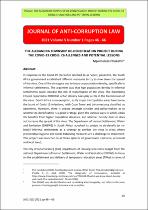| dc.contributor.author | Phakathi, Mpumelelo | |
| dc.date.accessioned | 2022-10-31T09:57:52Z | |
| dc.date.available | 2022-10-31T09:57:52Z | |
| dc.date.issued | 2022 | |
| dc.identifier.citation | Phakathi, M. (2022). The Alexandra township de-densification project during the Covid-19 crisis: Challenges and potential lessons. Journal of Anti-Corruption Law, 5(1), 46-66 | en_US |
| dc.identifier.issn | 2521-5345 | |
| dc.identifier.uri | http://hdl.handle.net/10566/8099 | |
| dc.description.abstract | In response to the Covid-19 (hereafter referred to as ‘virus’) pandemic, the South Africa government established different measures to try to slow down the spread of the virus. One of the strategies was to focus on population density, specifically in informal settlements. The argument was that high population density in informal settlements could increase the risk of transmission of the virus. The Bloomberg CityLab reported in 2020 that urban density does play a role in the transmission of the virus.1 South Africa is no exception, as its major metropolitan areas have borne the brunt of Covid-19 infections, with Cape Town and Johannesburg classified as epicentres. | en_US |
| dc.language.iso | en | en_US |
| dc.publisher | University of the Western Cape | en_US |
| dc.subject | Covid-19 | en_US |
| dc.subject | Public health | en_US |
| dc.subject | Informal settlements | en_US |
| dc.subject | Water and sanitation | en_US |
| dc.subject | Alexandra township | en_US |
| dc.title | The Alexandra township de-densification project during the Covid-19 crisis: Challenges and potential lessons | en_US |
| dc.type | Article | en_US |

